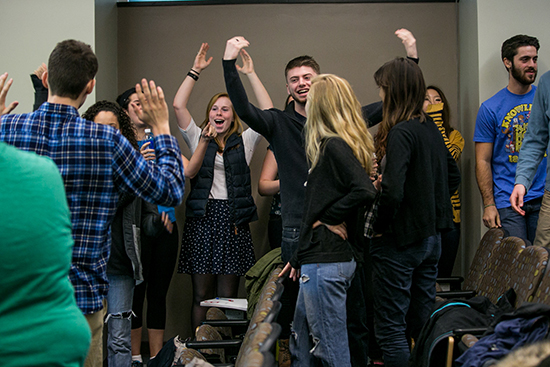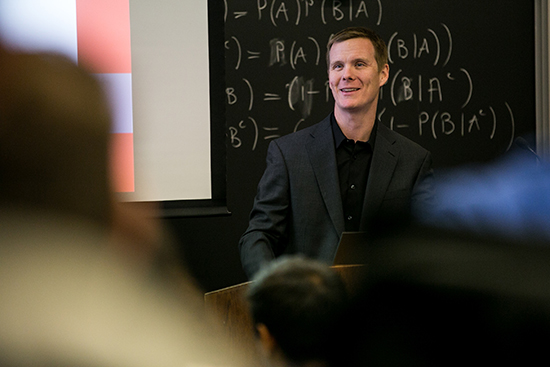You Can’t Always Get the Caucus You Want…
Class demonstrates how voting rules can make or break a candidate

Students cheer for John Kasich, who won a mock Iowa Republican caucus in Douglas Kriner’s class on the American presidency. Photos by Kristyn Ulanday
Class by class, lecture by lecture, question asked by question answered, an education is built. This is one of a series of visits to one class, on one day, in search of those building blocks at BU.
One morning, Democratic activist Keith Drucker is prominently pictured on BU Today making phone calls on behalf of Hillary Clinton’s presidential campaign. Later the same day we hear him firmly declare his allegiance to conservative Rand Paul in a Republican caucus.
No, Drucker (CAS’16, Questrom’17) is not betraying his candidate. This “caucus” is a classroom exercise, the centerpiece of the Presidential Leadership class taught by Douglas Kriner, a College of Arts & Sciences associate professor of political science.
The course, which is taught at least one semester each academic year, covers presidential power, relations with Congress and the public, and leadership styles of the presidents, among other topics. But Kriner is, conveniently, shifting the lessons to take advantage of this year’s real-life campaign. And today’s lesson, titled “The Rules of the Game Matter,” is tied to the February 1 Iowa caucuses and February 9 New Hampshire primaries.
He explains how the tumult of the 1968 Democratic National Convention led to reforms that took much of the power to select candidates away from the parties’ insiders and gave it to voters participating in primaries and caucuses. The results, he says, include the emergence of a dramatically different kind of candidate, one from outside the traditional party power structures, with Donald Trump, Carly Fiorina, Ben Carson, and Bernie Sanders among this year’s prime examples.
“Trump, Carson, even Bernie Sanders would never have stood a snowball’s chance pre-1972,” Kriner says, adding that their presence changes a lot more than just the nightly news. “They have different backgrounds, different skills—and different incentives. That’s going to have ramifications for how they would go about governing.”
Kriner wants the students to understand how rules that look mind-numbingly dull can shape an election. He explains how New Hampshire voters can switch their party at the polling place on primary election day. And he coordinates a mock Iowa caucus, using the Republican field because, he says, more candidates make it more fun.
A clear majority of the 50 students—many of them poli sci majors—are Democrats, although there is a sprinkling of supporters for Trump, Rubio, and Paul. Several point to John Kasich as the most moderate voice in the Republican field.
Kriner believes the stereotype of today’s undergraduates as uninterested in politics is a bad rap, but he admits that the 2016 race is not firing up students the way the 2008 one did. “There was tremendous energy behind the Obama movement,” he says. “There’s energy at BU now, primarily on the Democratic side, and probably for Bernie more than for Hillary. But it doesn’t seem to be the same.”

At Kriner’s instruction, the class breaks into small groups to discuss which Republican to support in the caucus. Drucker talks with other political science majors in the front row.
He takes a stand for Rand Paul, as close to a sincere choice as he can make among Republicans. “I think he’s pretty bold,” Drucker says. “I saw his NSA filibuster speech on the Senate floor, and he’s got a lot of guts to do something like that.”
The polarizing Cruz is the initial choice of Democrat Abbey Kaelberer (CAS’17), who says that in real life “Martin O’Malley is my top choice, surprisingly.” At Drucker’s urging, she ends up switching to Paul.
“I’m going with Marco,” says Alex Siordia (CAS’18), also a Democrat and likely Sanders supporter in real life. He says he’s swayed by Rubio’s plan to allow college grads to pay back student loans based on their income.
When they scatter to the corners by candidate, the tally is clear: Rubio, 13; Trump, 11; Kasich, 10; Chris Christie, 9; Paul, 5; Carson, 1. Fiorina, Ted Cruz, and onetime front-runner Jeb Bush get a big goose egg. So under Republican caucus rules, Rubio wins Iowa’s caucus.
But, Kriner says, what if we use the Iowa Democrats’ rules establishing a certain minimum number of votes for viability. He sets the number at 10, leaving three candidates, Rubio, Trump, and Kasich, and calls for a revote.
“I canned Christie just so more people would move,” he says cheerfully. “Somebody messing with election results? That never happens.”
Drucker and Kaelberer move to Kasich country. When the students are done shuffling around the room, another head count reveals big changes in the order of finish. Trump still has 11, and previous winner Rubio gains one to tally 14. But Kasich has 22, making him the winner under Kriner’s version of the Dems’ rules.
A “Kasich! Kasich! Kasich!” chant erupts from the group gathered against the room’s far wall.
Kriner then brings up Texas, which has both a primary and a caucus. It can all seem very confusing, especially to international students. “It’s American exceptionalism at its worst,” he says. “Only we could come up with a system this crazy.”
By the end of the hour, his students have a better understanding of the craziness. Many of them should be able to meet the challenge he gave them at the beginning of the class: “Be ambassadors. If you see people looking at a TV on February 1 or February 9 and they look puzzled, jump in and help them figure out the madness that they see.”
Douglas Kriner and Dino Christenson, also a CAS associate professor of political science, are hosting students tonight to watch TV coverage of the Iowa caucuses at 7:30 p.m. at the StuViII TV Lounge, 10 Buick St.
This Series
Also in
One Class, One Day
-
November 30, 2018
Breaking Bad Director Gives CAS Class the Inside Dope
-
October 31, 2018
Trump and the Press: We’ve Been Here Before
-
August 3, 2018
A Scholarly Take on Superheroes

Comments & Discussion
Boston University moderates comments to facilitate an informed, substantive, civil conversation. Abusive, profane, self-promotional, misleading, incoherent or off-topic comments will be rejected. Moderators are staffed during regular business hours (EST) and can only accept comments written in English. Statistics or facts must include a citation or a link to the citation.